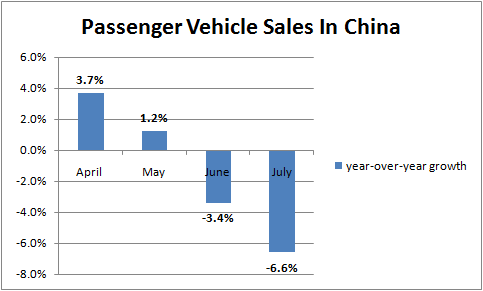Analyzing The China Market: The Struggles Of Premium Automakers Like BMW And Porsche

Table of Contents
Intense Domestic Competition
The Chinese automotive market is no longer dominated solely by international players. The rise of domestic brands presents a significant hurdle for established premium automakers.
Rise of Domestic Luxury Brands
The rapid advancement of homegrown luxury brands like Nio, Xpeng, and Li Auto is reshaping the competitive landscape. These brands are aggressively challenging established players like BMW and Porsche.
- Aggressive marketing campaigns: Targeting younger, tech-savvy consumers through vibrant digital marketing and impactful social media strategies.
- Rapid technological innovation: Integrating cutting-edge features like advanced driver-assistance systems (ADAS), seamless connectivity, and innovative battery technologies.
- Strong government support: Benefiting from government subsidies and policies designed to promote domestic automakers.
- Growing consumer preference: A rising sense of national pride is leading many Chinese consumers to prioritize domestically produced vehicles. This shift in consumer sentiment presents a clear challenge to foreign brands.
Price Sensitivity and Value Perception
Chinese consumers, while appreciating luxury, are also highly price-sensitive. They meticulously compare value propositions, considering not just the price tag but also the overall ownership experience. This makes premium pricing strategies challenging for foreign brands.
- High service expectations: Premium prices demand commensurate levels of service, including personalized experiences, convenient maintenance, and responsive customer support.
- Competitive financing: Attractive financing and leasing options are critical to winning over price-conscious buyers.
- Import costs: Import tariffs and taxes significantly impact the final price, making it harder for foreign brands to compete on price. Strategic pricing and localization become vital considerations for success within the China Market Premium Automakers segment.
Navigating Regulatory and Political Landscape
The Chinese automotive market is characterized by a dynamic and evolving regulatory environment. Understanding and adapting to these changes are critical for survival.
Shifting Government Regulations
Frequent regulatory changes impact various aspects of the automotive industry, including emissions standards, import tariffs, and safety regulations. Adaptability is key to navigating this complex landscape.
- Stringent emission standards: The push for electric vehicles (EVs) and stricter emission regulations requires significant investment in electrification technologies.
- Complex import procedures: Bureaucratic hurdles and complex import procedures add to the challenges of bringing vehicles into the Chinese market.
- Fluctuating government policies: Changes in government policies related to foreign investment can create uncertainty and impact business strategies. Careful monitoring and proactive adaptation are paramount.
Geopolitical Factors
Geopolitical tensions can significantly influence brand perception and supply chain stability, creating added uncertainty for premium automakers.
- Negative media coverage: Geopolitical events can impact consumer sentiment, leading to negative perceptions of certain brands.
- Supply chain disruptions: Trade tensions and sanctions can disrupt global supply chains, affecting production and delivery timelines.
- Import cost fluctuations: Trade wars and sanctions can lead to unpredictable fluctuations in import costs, impacting profitability and pricing strategies within the China Market Premium Automakers arena.
Understanding Unique Consumer Preferences
Understanding the unique preferences and behaviors of Chinese consumers is crucial for success. This means adapting to their technological sophistication and digital habits.
Technological Sophistication and Digitalization
Chinese consumers are early adopters of technology and expect advanced features in their vehicles. Failing to meet these expectations can lead to lost sales.
- Advanced technology integration: Features like AI, autonomous driving capabilities, and advanced infotainment systems are highly valued.
- Seamless digital integration: Integration with popular Chinese mobile payment systems and digital services is crucial for a positive user experience.
- Personalized digital experiences: Offering personalized digital experiences and customized features enhances consumer engagement and loyalty.
Social Media Influence and Brand Perception
Social media plays a dominant role in shaping consumer opinions in China. Online reviews and influencer marketing wield significant power. Managing brand reputation effectively is paramount.
- Effective social media strategies: A robust social media presence and targeted marketing campaigns are essential for reaching the target demographic.
- Online reputation management: Active monitoring and management of online brand reputation are vital to mitigate negative feedback and build trust.
- Leveraging Key Opinion Leaders (KOLs): Collaborating with influential KOLs for impactful marketing campaigns can significantly boost brand visibility and credibility within the China Market Premium Automakers landscape.
Conclusion
The China market presents both immense opportunity and significant challenges for premium automakers like BMW and Porsche. Success hinges on understanding and adapting to the unique competitive landscape, navigating complex regulations, and catering to the technologically savvy and discerning Chinese consumer. By addressing the issues highlighted above – intense domestic competition, regulatory hurdles, and specific consumer preferences – premium automakers can enhance their strategies and better position themselves for growth. Ignoring these factors risks losing significant market share in this crucial automotive market. Invest time in thorough market analysis of the China Market Premium Automakers sector to develop a successful long-term strategy.

Featured Posts
-
 Adin Hill Leads Vegas Golden Knights To 4 0 Victory Over Columbus Blue Jackets
May 10, 2025
Adin Hill Leads Vegas Golden Knights To 4 0 Victory Over Columbus Blue Jackets
May 10, 2025 -
 Strengthening Allyship Your Guide To International Transgender Day Of Visibility
May 10, 2025
Strengthening Allyship Your Guide To International Transgender Day Of Visibility
May 10, 2025 -
 Elon Musks Influence Tesla Stock Drop And The Impact On Dogecoin
May 10, 2025
Elon Musks Influence Tesla Stock Drop And The Impact On Dogecoin
May 10, 2025 -
 Invest Smart The Countrys Top New Business Locations
May 10, 2025
Invest Smart The Countrys Top New Business Locations
May 10, 2025 -
 Unprovoked Racist Stabbing Leaves Man Dead Woman In Custody
May 10, 2025
Unprovoked Racist Stabbing Leaves Man Dead Woman In Custody
May 10, 2025
